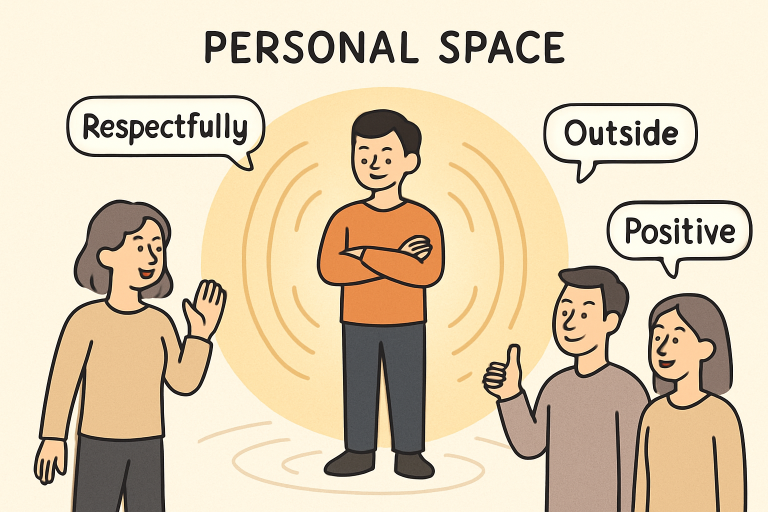Establishing healthy boundaries is crucial for maintaining overall well-being, shaping our interactions with others, and caring for ourselves. Boundaries define where we end and other people begin—they are the invisible lines that separate our physical space, emotions, needs, and responsibilities from those of others. By clearly defining personal limits, individuals can ensure that their relationships are both respectful and balanced. This intentional approach safeguards one’s emotional and mental health, making it easier to navigate day-to-day challenges without feeling overwhelmed or taken advantage of. Whether you’re facing pressure at work, challenges in your family life, or simply looking to strengthen your sense of self, learning to set boundaries is a skill that touches every area of life. In moments when it’s challenging to establish or maintain effective boundaries, seeking professional guidance from Mindsight psychological services Grand Rapids, MI can provide valuable tools and support for long-term emotional balance.
Without clear boundaries, people may find themselves overwhelmed, experiencing significant stress, burnout, and even strained or toxic relationships. Lacking clear limits can lead us to say “yes” too often, work late into the night, or take on emotional burdens that aren’t truly ours to manage. Over time, this can drain our energy, diminish our sense of self-worth, and damage our ability to function in daily life. Recognizing the importance of setting boundaries and actively cultivating them can empower individuals to lead more balanced and fulfilling lives, thereby protecting their mental health in the long term. These skills are especially vital in today’s quick-paced and often demanding environment, where the lines between work, home, and social life can easily blur.
Table of Contents
Key Takeaways
- Healthy boundaries protect mental health by preventing stress and burnout.
- Clear communication is vital when setting and maintaining boundaries.
- Consistent practice of setting boundaries leads to improved relationships and increased self-esteem.
Understanding the Importance of Boundaries
Boundaries act as essential guidelines for how we engage with others, shaping the dynamics in every relationship. Whether at home, work, or in social circles, strong boundaries help us communicate our needs and expectations clearly and respectfully. When our boundaries are respected and honored, we feel safe, valued, and respected, which helps nurture trust and openness in all interactions. By understanding and respecting our own boundaries, we also give clear cues to others to do the same—making it much less likely that we will be taken advantage of or neglected. This not only helps us avoid situations that lead to discomfort, resentment, or internal conflict but also empowers us to cope with life’s challenges in a healthier, more adaptive way. Robust boundaries are indispensable during times of stress or transition, such as changing jobs or navigating family issues, because they help establish a consistent foundation. Research highlighted by Psychology Today confirms that boundaries contribute to enhanced emotional resilience, making it easier to navigate complex social interactions and manage difficult emotions with greater skill.
Types of Boundaries
Physical Boundaries
Physical boundaries relate to your personal space and how you are comfortable with physical touch or interaction. These boundaries are often instinctive—a feeling of discomfort when someone stands too close or touches you unexpectedly can indicate a boundary that has been violated. Respecting physical boundaries is crucial for ensuring comfort, safety, and autonomy in interactions with others. For example, some people enjoy hugs as a form of greeting, while others may prefer a handshake, nod, or smile. Clearly communicating and respecting these preferences helps foster relationships where each party feels respected and secure, minimizing misunderstandings and awkwardness.
Emotional Boundaries
Emotional boundaries help individuals separate their feelings from those of others. They involve managing your own emotional responses rather than taking on responsibility for how someone else thinks or feels. Emotional boundaries encourage you to recognize, express, and protect your feelings, while also allowing room for others to do the same. When emotional boundaries are weak, you might feel drained or entangled by other people’s moods, problems, or criticisms, which could lead to resentment or anxiety. Establishing these boundaries enables you to support others without neglecting your own needs, thereby preventing codependency and emotional exhaustion. This is especially important in relationships where one person may regularly rely on the other for emotional support. Recognizing where your emotional responsibility ends and someone else’s begins is not selfish—both people must remain healthy and resilient.

Time Boundaries
Time boundaries protect how you allocate hours throughout your day, allowing you to meet your responsibilities and enjoy personal activities without guilt or obligation. Setting time boundaries means recognizing your needs for rest, fun, work, and personal time, and being able to communicate your schedule to others. This can involve limiting overtime, planning regular breaks, and prioritizing tasks, or declining invitations when your schedule is full. By honoring your own time, you ensure that you are not overcommitted or stretched too thin, and others learn to respect your availability. Maintaining firm time boundaries is especially crucial for parents, caregivers, students, and professionals who juggle multiple roles. Successfully managing your schedule and energy allows you to be more present, productive, and fulfilled.
Material Boundaries
Material boundaries concern your possessions and finances. This type of boundary outlines what you are comfortable sharing—whether it’s your car, money, personal items, or other resources. Being clear about what you will and will not share helps prevent misunderstandings, resentment, and conflict. For example, you might feel comfortable lending a book or an item of clothing, but not your car or laptop. Financial boundaries may also mean communicating your limits around lending or giving money. Healthy material boundaries help preserve trust in relationships and ensure that you are not left feeling exploited or taken for granted. They remind us that it is okay to say “no” when something is beyond our comfort zone or means.
Mental Boundaries
Mental boundaries involve your thoughts, values, beliefs, and opinions. Maintaining healthy mental boundaries enables you to remain true to your beliefs while listening respectfully to differing viewpoints, particularly during disagreements or debates. It means retaining your sense of self and independent thinking even if others challenge or criticize your perspective. This type of boundary is crucial for fostering healthy discussions, particularly in environments where individuals hold diverse views and backgrounds. Encouraging open dialogue while remaining firm in your convictions helps build mutual respect and deeper understanding, even when consensus is not possible.
Steps to Establish Healthy Boundaries
- Self-Reflection: Take time to identify your personal limits, paying attention to situations that leave you feeling uncomfortable, resentful, or drained. Keep a journal or set aside quiet moments for self-assessment—this practice can offer insight into where your boundaries may need strengthening.
- Clear Communication: Practice expressing your needs and boundaries assertively, ensuring you are both respectful and direct in conversations. Use “I” statements to keep your message focused on your own experience (e.g., “I feel overwhelmed when…”), which reduces defensiveness and increases the chances of being heard.
- Consistency: Reiterate your boundaries regularly. Being consistent reinforces their importance and helps establish clear expectations with others. Even if people initially resist or push back, holding firm will eventually lead to greater understanding and respect.
- Practice Saying No: Remember that declining requests that do not align with your limits is not only acceptable but also necessary for self-care. Saying no may feel uncomfortable at first, but it gets easier with practice and is an important act of self-respect.
- Seek Support: If you struggle with establishing or maintaining boundaries, seeking guidance from a mental health professional can be very helpful. Therapists can offer tools for assertiveness, conflict resolution, and self-care, and can help you process any guilt or anxiety that arises when you stand up for yourself.
Benefits of Healthy Boundaries
- Significantly reduces feelings of stress and prevents emotional burnout, helping you maintain mental wellness in all aspects of life.
- Boosts self-esteem and nurtures a sense of self-respect by prioritizing personal needs, showing yourself and others that your feelings and priorities matter.
- Improves the quality of relationships by fostering mutual respect and understanding. Healthy boundaries establish a foundation for clear expectations, open communication, and trust among individuals.
- Promotes autonomy and increases your control over decisions involving your life, giving you the freedom to make choices that are best for your health and happiness.
Challenges in Setting Boundaries
Despite the many benefits, setting healthy boundaries can be a challenging process, especially for those who are used to prioritizing others over themselves or who fear conflict. Common challenges include fears of rejection, guilt, feeling selfish, or worrying about damaging important relationships when you assert your needs. At times, others may react with disappointment, anger, or confusion, especially if they are not accustomed to your boundaries. These experiences are often temporary, however, and boundary-setting is a skill that grows with patience, practice, and support. During tough periods, seeking encouragement and advice from trusted friends, family, or professional therapists can make a significant difference. Overcoming these challenges takes time, but as you build your confidence and resilience, maintaining boundaries becomes easier as a natural part of self-care and healthy relating.
Final Thoughts
Setting and maintaining healthy boundaries is a fundamental component of mental wellness. By taking the time to define your limits, communicating assertively, and consistently upholding your needs, you can protect your mental health while enhancing the quality of your relationships. As you refine your boundary-setting skills, you’ll notice more balance, less stress, and clearer communication in every area of your life. Remember, the journey of setting boundaries is ongoing, requiring self-awareness and support. With practice and perseverance, you will experience greater balance, confidence, and well-being, which will positively impact both yourself and those around you.
- Top Group Camping Activities to Enhance Your Outdoor Experience - February 26, 2026
- How Modern Orthodontics Is Changing Smiles for All Ages - February 26, 2026
- How Personalized Weight Loss Plans Are Transforming Lives - February 26, 2026

